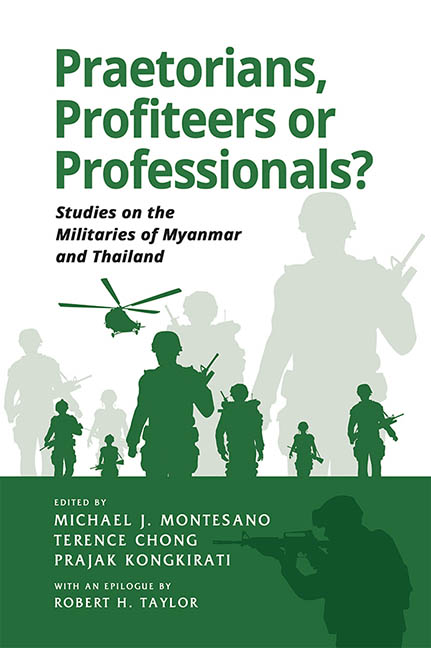Book contents
- Frontmatter
- Contents
- Acknowledgements
- About the Contributors
- 1 Introduction: Two Mainland Southeast Asian Militaries in Comparative Perspective
- 2 A New Tatmadaw with Old Characteristics
- 3 Thailand’s Military: Ideology and Sense of Mission
- 4 The Defence Expenditures and Commercial Interests of the Tatmadaw
- 5 The Economic Role of the Thai Military: A Commercial Logic to Coups?
- 6 Epilogue: Controlling or Playing Politics?
- Index
6 - Epilogue: Controlling or Playing Politics?
Published online by Cambridge University Press: 09 October 2021
- Frontmatter
- Contents
- Acknowledgements
- About the Contributors
- 1 Introduction: Two Mainland Southeast Asian Militaries in Comparative Perspective
- 2 A New Tatmadaw with Old Characteristics
- 3 Thailand’s Military: Ideology and Sense of Mission
- 4 The Defence Expenditures and Commercial Interests of the Tatmadaw
- 5 The Economic Role of the Thai Military: A Commercial Logic to Coups?
- 6 Epilogue: Controlling or Playing Politics?
- Index
Summary
… when [the army] was mistaken enough to come down into the arena and to play politics instead of controlling them, it began a descent which ended in its abject defeat – militarily, politically, spiritually. (Wheeler-Bennett 2005 [1953], p. xxxii)
To whom or what does an army—as the primary force of the sole legitimate yielder of violence on behalf of a community with its own internationally recognized territory, the state—owe its loyalty? To representations of the state—the constitution, the head of state, the nation, a noble ideal, its own professional éclat? Or to the government—the president or prime minister, the legislature, the ruling party of the day? This dilemma is at the heart of all discussions of civil-military relations. Those who believe that armies are not faced with this dilemma live in fantasyland. The army, as a central pillar of the modern state, is inevitably a political institution, and the answer to the opening question above is quintessentially a political one. The answers given to this question at various times have determined the role of the armies of Thailand and Myanmar, and of most of the other countries in Southeast Asia if not the world, since the formation of the modern, professional militaries of independent states. Both of those armies, since 1911 in the case of Thailand and since 1948 in the case of Myanmar, have been deeply involved in politics, but to different degrees at different times. The devil, as always, is in the detail, as the contributions to this volume make amply clear.
The extensive theoretical literature on the political role of the military has provided a variety of taxonomies for the degree of military involvement in politics during the course of the past century and more. For example, Samuel Finer, in his classic The Man on Horseback, set out six levels of involvement—from normal constitutional mechanisms through to intimidation and threats, and to failure to protect or outright violence against civilian authorities (Finer 2005, p. 140). Like Finer, other analysts lay out various continua of degrees to which the military directly involves itself in politics, up to and including direct military rule such as that in Myanmar between 1988 and 2011 and in Thailand between—most recently—2015 and 2019.
- Type
- Chapter
- Information
- Praetorians, Profiteers or Professionals?Studies on the Militaries of Myanmar and Thailand, pp. 150 - 167Publisher: ISEAS–Yusof Ishak InstitutePrint publication year: 2020

